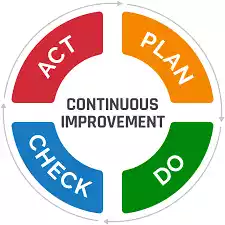When undertaking an ISO certification assessment, the term “nonconformance” can sound alarming to quality managers, business owners, safety managers, and environmental consultants. However, nonconformances are not just red flags highlighting problems. They provide valuable information that underlines areas for improvement and help organizations strengthen their processes. In this blog post, we will take a deep dive into what nonconformances are, explore their benefits, dispel common misconceptions, and discuss how they can enhance your business processes.
What is the Definition of Nonconformances?
In the realm of ISO certification, a nonconformance is defined as deviation from the pre-established standards or requirements set forth by the relevant ISO standard. This can be anything from a minor documentation error to a significant process failure. Nonconformances are typically categorized as:
- Minor Nonconformances: Small deviations that do not impact the overall integrity of the management system. There may have been a breakdown in the implementation of a procedure or the partial breakdown of procedures.
- Major Nonconformances: Significant deviations that, if left unaddressed, could jeopardize the effectiveness of the management system. This is a total failure in the system or a number of minor nonconformances related to the same clause.
Nonconformances are identified during internal audits, third-party assessments, or even day-to-day operations. While they might initially seem like setbacks, they play a critical role in driving continuous improvement within an organization.
What Are the Benefits of Nonconformances?
1. Identifying Weaknesses and Gaps
Nonconformances shed light on the areas where your organization does not meet the required standards. By identifying these weaknesses and gaps, you develop a greater awareness of where improvements are needed.
2. Continuous Improvement
The essence of ISO certification is continuous improvement. Nonconformances act as catalysts for this improvement by highlighting areas that require attention. Addressing these issues fosters a culture of ongoing development and enhances the organization’s overall performance.
3. Enhancing Compliance and Risk Management
Nonconformances provide a structured approach to compliance and risk management. By identifying and rectifying deviations, you minimize the risk of future noncompliance and associated penalties. This proactive approach contributes to a safer and more compliant working environment.
4. Strengthening Employee Training and Awareness
Addressing nonconformances often involves training employees and raising awareness about the importance of adhering to standards. This not only improves individual performance but also fosters a culture of accountability and diligence across the organization.
Why We Have Misconceptions About Nonconformances?
Fear of Negative Perception
One of the main reasons for misconceptions about nonconformances is the fear of negative perception. Many organizations worry that acknowledging nonconformances will make them appear inefficient or incompetent.
Resistance to Change
Change can be uncomfortable, and addressing nonconformances often requires altering established processes. This resistance to change can lead to misconceptions about the necessity and benefits of addressing nonconformances. Encouraging a culture of adaptability and openness to change can help overcome this hurdle.
How Nonconformances Can Help Enhance Your Business Processes
- Root Cause Analysis
Nonconformances prompt organizations to undertake root cause analyses to understand why deviations occurred. This deep dive into the underlying causes prevents recurrence and leads to more robust and effective processes.
- Streamlining Processes
Addressing nonconformances often reveals inefficiencies and redundancies in existing processes. By streamlining these processes, organizations can achieve greater efficiency, reduce waste, and optimize resource utilization.
- Fostering Innovation
Nonconformances challenge organizations to think creatively and find innovative solutions to address issues. This fosters a culture of innovation and encourages employees to explore new methods and technologies to enhance their work.
- Building a Culture of Accountability
Addressing nonconformances promotes a culture of accountability within the organization. Employees become more aware of the importance of adhering to standards and take ownership of their roles in maintaining compliance and quality.
Conclusion
Nonconformances during ISO certification assessments are far from being detrimental. Instead, they are valuable tools that drive continuous improvement, enhance compliance, and foster a culture of accountability and innovation. By embracing nonconformances, organizations can identify weaknesses, streamline processes, and ultimately achieve higher levels of quality and performance.
Remember, addressing nonconformances is not about pointing fingers or assigning blame. It is about recognizing opportunities for growth and taking proactive steps to enhance your organization’s operations. So, the next time you encounter a nonconformance, view it as a stepping stone towards a stronger, more resilient, and successful organization.
To find out more about the ISO Certification process, Contact Us Today
Why Sustainable Certification?
At the heart of our business is a dedication to the client. We understand that for many business-owners, this could be their first attempt at achieving certification and our goal is to make the process as simple and transparent as possible. If your organisation is going to tender and working alongside your first certification agency, or looking for a more efficient, agile approach to certification, we have the solution for you.
All Sustainable Certification clients have access to an ‘industry first’ client portal which provides clear insight and understanding of the whole status and stage of the audit process. This gives clients the peace of mind to know they are on the right track at every stage of the certification journey. Dedicated and focused account managers mean each client has continual support for every step, making the progression to success streamlined and hassle free.
At Sustainable Certification, we are proud of what our clients say about us. We are regularly seeking feedback from them about how they feel supported and the value we can bring to their organisations.